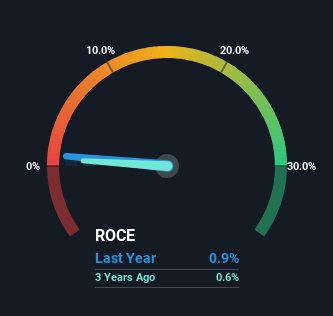Returns On Capital At China Partytime Culture Holdings (HKG:1532) Paint A Concerning Picture

To avoid investing in a business that's in decline, there's a few financial metrics that can provide early indications of aging. More often than not, we'll see a declining return on capital employed (ROCE) and a declining amount of capital employed. Basically the company is earning less on its investments and it is also reducing its total assets. In light of that, from a first glance at China Partytime Culture Holdings (HKG:1532), we've spotted some signs that it could be struggling, so let's investigate.
Understanding Return On Capital Employed (ROCE)
Just to clarify if you're unsure, ROCE is a metric for evaluating how much pre-tax income (in percentage terms) a company earns on the capital invested in its business. The formula for this calculation on China Partytime Culture Holdings is:
Return on Capital Employed = Earnings Before Interest and Tax (EBIT) ÷ (Total Assets - Current Liabilities)
0.0093 = CN¥4.0m ÷ (CN¥556m - CN¥126m) (Based on the trailing twelve months to June 2023).
So, China Partytime Culture Holdings has an ROCE of 0.9%. Ultimately, that's a low return and it under-performs the Luxury industry average of 11%.
View our latest analysis for China Partytime Culture Holdings

While the past is not representative of the future, it can be helpful to know how a company has performed historically, which is why we have this chart above. If you'd like to look at how China Partytime Culture Holdings has performed in the past in other metrics, you can view this free graph of past earnings, revenue and cash flow.
What Can We Tell From China Partytime Culture Holdings' ROCE Trend?
We are a bit worried about the trend of returns on capital at China Partytime Culture Holdings. About five years ago, returns on capital were 1.7%, however they're now substantially lower than that as we saw above. Meanwhile, capital employed in the business has stayed roughly the flat over the period. This combination can be indicative of a mature business that still has areas to deploy capital, but the returns received aren't as high due potentially to new competition or smaller margins. If these trends continue, we wouldn't expect China Partytime Culture Holdings to turn into a multi-bagger.
Our Take On China Partytime Culture Holdings' ROCE
In summary, it's unfortunate that China Partytime Culture Holdings is generating lower returns from the same amount of capital. Unsurprisingly then, the stock has dived 79% over the last five years, so investors are recognizing these changes and don't like the company's prospects. With underlying trends that aren't great in these areas, we'd consider looking elsewhere.
If you'd like to know about the risks facing China Partytime Culture Holdings, we've discovered 2 warning signs that you should be aware of.
While China Partytime Culture Holdings may not currently earn the highest returns, we've compiled a list of companies that currently earn more than 25% return on equity. Check out this free list here.
New: AI Stock Screener & Alerts
Our new AI Stock Screener scans the market every day to uncover opportunities.
• Dividend Powerhouses (3%+ Yield)
• Undervalued Small Caps with Insider Buying
• High growth Tech and AI Companies
Or build your own from over 50 metrics.
Have feedback on this article? Concerned about the content? Get in touch with us directly. Alternatively, email editorial-team (at) simplywallst.com.
This article by Simply Wall St is general in nature. We provide commentary based on historical data and analyst forecasts only using an unbiased methodology and our articles are not intended to be financial advice. It does not constitute a recommendation to buy or sell any stock, and does not take account of your objectives, or your financial situation. We aim to bring you long-term focused analysis driven by fundamental data. Note that our analysis may not factor in the latest price-sensitive company announcements or qualitative material. Simply Wall St has no position in any stocks mentioned.
About SEHK:1532
China Partytime Culture Holdings
An investment holding company, designs, develops, produces, markets, and sells cosplay apparels and lingerie products.
Flawless balance sheet very low.
Market Insights
Community Narratives




